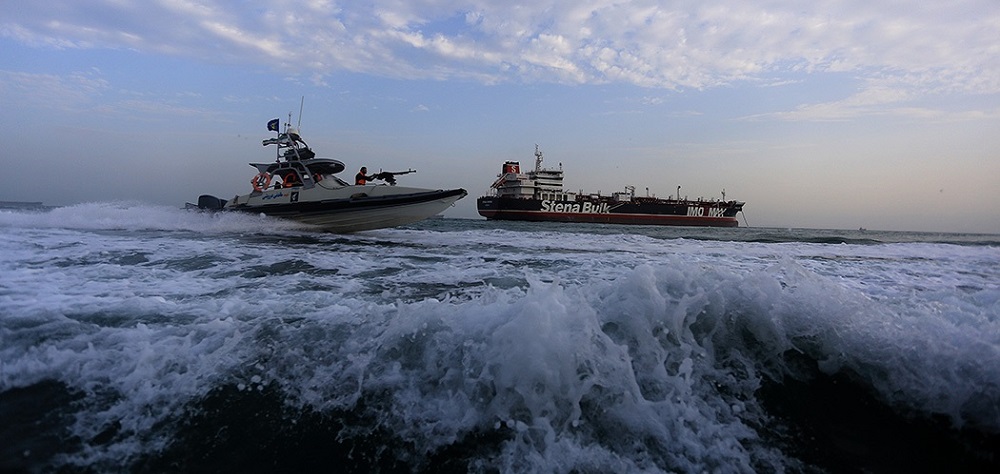Alwaght- Nearly three decades after the Tanker War in the Strait of Hormuz in the 1980s, the strategic waterway’s name is again back to the media headlines as new oil tankers crisis begins to brew amid escalated regional tensions.
On Friday, the media in breaking news rushed to report that Iran’s Islamic Revolutionary Guards Corps (IRGC) seized a British oil tanker in the Strait of Hormuz.
Until the late night of Friday Iran time, the world media continued to extensively cover in details the reactions to the seizure of the British-flagged tanker, named Stena Impero. The political and security reactions to the Iranian measure continue to unfold.
In the initial look and analysis, the confiscation of the British oil tanker seems to be quite a political matter. But the fact is that a major part of the incident was caused by the breach of the international navigation laws by the British vessel that led to its seizure by the IRGC’s special forces and arrest of its crew that came at the request of Iran’s Ports and Maritime Organization.
Violating the “safe passage” principle
In the international maritime laws, there is an essential principle dubbed “safe passage”. This term is a legal concept in the United Nations Convention on the Law of the Sea that allows the vessels to pass through the territorial waters of a country with consideration of some specific regulations. According to the principle of safe passage, as long as the peace, order, and security of the coastal country is not compromised by a passing vessel, the passage is safe. Such a passage is in compliance with the UN convention and other sea-related international legal treaties and rules.
This principle and its definition considered, Stena Impero ship has breached the safe passage at least in three international naval regulations. Here they are.
1. Turning off the AIS: According to documents presented by Iran, the British ship switched off its Automatic Identification System (AIS) to avoid cooperation with the Hormozgan province’s maritime navigation control center. The center sent three times altering messages to the vessel only to find the ship unresponsive. According to the law, when a ship enters territorial waters of a country, its AIS should be turned on. Turned off AIS system and the consequent alters by the navigation center and a failure of the tanker to respond in practice meant a violation of order and security of the Iranian territorial waters.
2. Causing an incident: As Iran’s Ports and Maritime Organization stated, the British vessel during its entry to the Iranian territorial waters collided to a fishing boat. It declined to respond to calls by the boat and continued its sailing amid “apparent” risks to other boats sailing in the region. This is cited as the second violation by the British tanker.
3. Causing environmental pollution: Oil pollution in the Iranian waters by the vessel is the third breach of safe passage. This is one of the causes leading to the seizure of the British ship.
Accordingly, the British oil tanker violated at least three international maritime regulations, something giving Iran every reason to seize it for violating the principle of the safe passage.
Iran’s regional security role, the message to London
On the other side, part of the reason for Iran to confiscate the oil tanker is linked to massage of political firmness Iran wants to send to the British government in the present regional circumstances. Iran has the longest coasts in the Persian Gulf and the Sea of Oman and of course Tehran has the right to grow the biggest concerns about the regional security developments.
In the shadow of the current conditions, any incident in any part of the Persian Gulf and Sea of Oman will recall extensive sensitivity of Iran compared with other regional states. Over the past few months, the US and other Western countries amassed their naval vessels in the region causing regional tensions to escalate. Iran, so, cannot be simply an observer of the developments with its title as a regional power. The maritime movements, though non-military, are naturally followed by bigger Iranian sensitivity. The seizure of the British vessel may send a clear message of Tehran to other commercial ships so that they take utmost precaution and respect the principle of safe passage during passing the Iranian waters. Such a sensitivity by the Iranian coastguard also promises further regional security as it displays Iran’s vigilance in the face of any insecurity and destabilizing measures compromising the freedom and safety of navigation in the region.



























